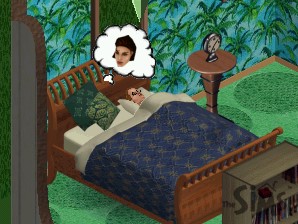Friday 2 November 2001

|
Pic of the day: Dreams may or may not be a way of learning. Sometimes we may hope they're not ... (Screenshot from The Sims.) Keep dreamingIn the latest issue of The Economist, there is an article about dreamsleep and learning. Actually it refers back to an article in this week's Science, but it was in The Economist I read it. Jerome Siegel, a neuroscientist, speaks out against the current view that REM sleep (in which we have the vivid dreams) is essential to learning, or even significant. He thinks that the ways in which people and lab animals have been kept from dreaming may be the cause of their learning problems, not the lack of REM sleep. As his witness is shown one man who, after a brain lesion, is unable to enter REM sleep at all. The guy has still done well enough in life. Also a certain class of antidepressiva (MAO inhibitors) hinders REM sleep with no averse effect on the patients. ***I think we have to look beyond the subjective experience of dream here. To recap briefly, our dreams start near the very center of the brain, in the tiny area that we have in common with not just mammals but also reptiles and birds. From a rather small point, a "bioelectric storm" of impulses are unleashed on the enighboring limbic system ("mammal brain"). The strength of this brain storm is second to only epileptical fits and perhaps a severe panic attack. In the primitive parts of the brain, the dreamstorm raises intense and primal feelings, sometimes fear, sometimes anger or lust. These and other emotions become the core of the dream experience. As the storm moves outward to the neocortex, it wakes memories and creates vivid hallucinations, the most obvious part of the dream. If all is well, the skeletal muscles are disabled in this part of sleep, otherwise we would also be physically active. Heart and lungs are certainly working as if we had a workout. The hippocampus, central to storing or at least indexing long term memories, is close to ground zero. Tests show that neurons that have been activated during the day are activated again during REM sleep. This supports the idea that dreamsleep aids learning, by providing automated repetition. Repeat use of the neural pathways of a memory is supposed to be essential to retain it. There are actual changes in the synapses, "long term potentiation", making them more efficient in transmitting that particular signal in the future. Another theory is that dreams help preserve our sanity by "flushing out" erroneous data. This would presumably explain the jumbled nature of most dreams. However this concept is mainly based on experiences with neural networks, an attempt at artificial intelligence on computers. While these neural networks are inspired by animal neurons, they are not the real thing. And they also quite frankly work on a much simpler level than the mammal brain. They are so far more comparable to insects, and these are not known to dream. (Though they are not known NOT to dream either. Who knows, I could be a butterfly dreaming that I am a man ...) Anyway, there is a connection between madness and lack of sleep. Volunteers have stayed without sleep for days on end, and reported hallucinations, mood changes, and obsessive thoughts. Those who stayed awake the longest showed symptoms similar to delirium. Now it so happens that delirium also can be induced by a lengthy drinking binge on alcoholics. And alcohol is a known REM blocker. ***As for antidepressant blocking REM sleep, this may be a main reason why these older antidepressants work at all. A common subtype of depression is characterized by reverse mood changes: In normal happy people, mood improves during sleep. In these depressive patients, mood worsens during sleep. Cutting down on sleep can actually help them, and it has been thought that it is REM sleep that for some reason works in reverse. In healthy people, dreams tend to be most negative early in the night and grow brighter towards the morning. On a side note, it is entirely possible that some people who use illegal drugs and alcohol do this as an attempt at self-medication. Attacking the substance use in this case will probably be futile unless one also treats the cause. In conclusion, I think it is premature to say that no one benefits from REM sleep just because some people don't. And the sheer fact that most mammals dream quite a bit seems to hint that it is useful for something. Besides, it can be great fun ... at least for some of us. |
All typos in this text is to be blamed on my right ring finger which hurts so much that I can't touch type normally. This confuses the rest of my fingers too. Sorry about that. |
Yesterday <-- This month --> Tomorrow?
One year ago
Two years ago
Three years ago